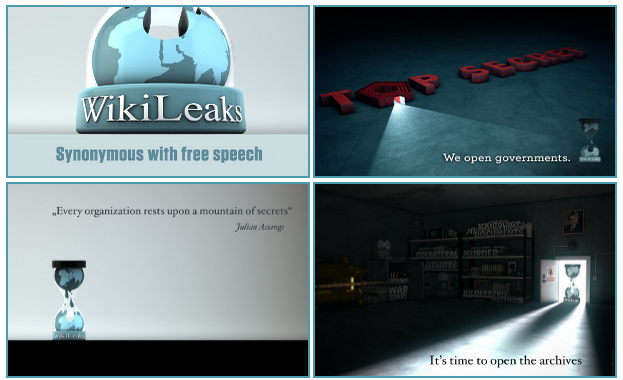|
Di seguito gli interventi pubblicati in questa sezione, in ordine cronologico.

By Julian Assange on Sunday, August 1st, 2010
Behind the ostensible government sits enthroned an invisible government owing no allegiance and acknowledging no responsibility to the people. To destroy this invisible government, to befoul this unholy alliance between corrupt business and corrupt politics is the first task of statesmanship.
(President Theodore Roosevelt)
While you here do snoring lie, Open-eyed conspiracy His time doth take.
(The Tempest; Ariel at II, i)
Introduction
To radically shift regime behavior we must think clearly and boldly for if we have learned anything, it is that regimes do not want to be changed. We must think beyond those who have gone before us, and discover technological changes that embolden us with ways to act in which our forebears could not.
Firstly we must understand what aspect of government or neocorporatist behavior we wish to change or remove. Secondly we must develop a way of thinking about this behavior that is strong enough carry us through the mire of politically distorted language, and into a position of clarity. Finally must use these insights to inspire within us and others a course of ennobling, and effective action.
Authoritarian power is maintained by conspiracy
Conspiracy, Conspire: make secret plans jointly to commit a harmful act; working together to bring about a particular result, typically to someone’s detriment. ORIGIN late Middle English : from Old French conspirer, from Latin conspirare agree, plot, from con- together with spirare breathe.
The best party is but a kind of conspiracy against the rest of the nation.
(Lord Halifax)
Where details are known as to the inner workings of authoritarian regimes, we see conspiratorial interactions among the political elite not merely for preferment or favor within the regime but as the primary planning methodology behind maintaining or strengthening authoritarian power.
Authoritarian regimes give rise to forces which oppose them by pushing against the individual and collective will to freedom, truth and self realization. Plans which assist authoritarian rule, once discovered, induce resistance. Hence these plans are concealed by successful authoritarian powers. This is enough to define their behavior as conspiratorial.
Thus it happens in matters of state; for knowing afar off (which it is only given a prudent man to do) the evils that are brewing, they are easily cured. But when, for want of such knowledge, they are allowed to grow until everyone can recognize them, there is no longer any remedy to be found.
(The Prince, Niccolo Machiavelli [1469-1527])
Terrorist conspiracies as connected graphs
Pre and post 9/11 the Maryland Procurement Office (National Security Agency light cover for academic funding, google for grant code “MDA904”) and others have funded mathematicians to look at terrorist conspiracies as connected graphs (no mathematical background is needed to follow this article).
We extend this understanding of terrorist organizations and turn it on the likes of its creators where it becomes a knife to dissect the power conspiracies used to maintain authoritarian government.
We will use connected graphs as way to harness the spatial reasoning ability of the brain to think in a new way about political relationships. These graphs are easy to visualize. First take some nails (“conspirators”) and hammer them into a board at random. Then take twine (“communication”) and loop it from nail to nail without breaking. Call the twine connecting two nails a link. Unbroken twine means it is possible to travel from any nail to any other nail via twine and intermediary nails. Mathematicians say the this type of graph is connected.
Information flows from conspirator to conspirator. Not every conspirator trusts or knows every other conspirator even though all are connected. Some are on the fringe of the conspiracy, others are central and communicate with many conspirators and others still may know only two conspirators but be a bridge between important sections or groupings of the conspiracy.
Separating a conspiracy
If all links between conspirators are cut then there is no conspiracy. This is usually hard to do, so we ask our first question: What is the minimum number of links that must be cut to separate the conspiracy into two groups of equal number? (divide and conquer). The answer depends on the structure of the conspiracy. Sometimes there are no alternative paths for conspiratorial information to flow between conspirators, othertimes there are many. This is a useful and interesting characteristic of a conspiracy. For instance, by assassinating one “bridge” conspirator, it may be possible to split the conspiracy. But we want to say something about all conspiracies.
Some conspirators dance closer than others
Conspirators are discerning, some trust and depend each other, others say little. Important information flows frequently through some links, trivial information through others. So we expand our simple connected graph model to include not only links, but their “importance”.
Return to our board-and-nails analogy. Imagine a thick heavy cord between some nails and fine light thread between others. Call the importance, thickness or heaviness of a link its weight. Between conspirators that never communicate the weight is zero. The “importance” of communication passing through a link difficult to evaluate apriori, since it its true value depends on the outcome of the conspiracy. We simply say that the “importance” of communication contributes to the weight of a link in the most obvious way; the weight of a link is proportional to the amount of important communication flowing across it. Questions about conspiracies in general won’t require us to know the weight of any link, since that changes from conspiracy to conspiracy.
Conspiracies are cognitive devices. They are able to out think the same group of individuals acting alone
Conspiracies take information about the world in which they operate (the conspiratorial environment), pass it around the conspirators and then act on the result. We can see conspiracies as a type of device that has inputs (information about the environment) and outputs (actions intending to change or maintain the environment).
What does a conspiracy compute? It computes the next action of the conspiracy
Now I we ask the question: how effective is this device? Can we compare it to itself at different times? Is the conspiracy growing stronger or weakening? This is a question that asks us to compare two values.
Can we find a value that describes the power of a conspiracy?
We could count the number of conspirators, but that would not capture the difference between a conspiracy and the individuals which comprise it. How do they differ? Individuals in a conspiracy conspire. Isolated individuals do not. We can capture that difference by adding up all the important communication (weights) between the conspirators, we will call this the total conspiratorial power.
Total conspiratorial power
This number is an abstraction. The pattern of connections in a conspiracy is unusually unique. But by looking at this value which in indepndent of the arrangement of conspiratorial connections we can make some generalisations.
If total conspiratorial power is zero, there is no conspiracy
If total conspiratorial power is zero, there is no information flow between the conspirators and hence no conspiracy.
A substantial increase or decrease in total conspiratorial power almost always means what we expect it to mean; an increase or decrease in the ability of the conspiracy to think, act and adapt.
Separating weighted conspiracies
I now return to our earlier idea about cleaving a conspiracy into halves. Then we looked at dividing a conspiracy into two groups of equal numbers by cutting the links between conspirators. Now we see that a more interesting idea is to split the total conspiratorial power in half. Since any isolated half can be viewed as a conspiracy in its own right we can continue splitting indefinitely.
How can we reduce the ability of a conspiracy to act?
We can marginalise a conspiracy’s ability to act by decreasing total conspiratorial power until it is no longer able to understand, and hence respond effectively to, its environment.
We can split the conspiracy, reduce or eliminating important communication between a few high weight links or many low weight links.
Traditional attacks on conspiratorial power groupings, such as assassination, have cut high weight links by killing, kidnapping, blackmailing or otherwise marginalizing or isolating some of the conspirators they were connected to.
An authoritarian conspiracy that can not think efficiently, can not act to preserve itself against the opponents it induces
When we look at a conspiracy as an organic whole, we can see a system of interacting organs, a body with arteries and veins whos blood may be thickened and slowed till it falls, unable to sufficiently comprehend and control the forces in its environment.
Fonte: thecommentfactory.com

Light swearing at the start or end of a persuasive speech can help influence an audience.
Lack of passion can be fatal to our attempts to persuade others of our point of view. Even if all the right facts are trotted out in an intelligible order, even if the argument is unassailable, when the speaker doesn't appear to believe it themselves, why should anyone else bother?
Show your passion, however, and people have one more emotional reason to come around to your point of view.
But how can we convince others of our conviction?
Up the intensity
One unconventional way is by using a little light swearing. The problem is that we run the risk of losing credibility and appearing unprofessional.
To see whether swearing can help change attitudes, Scherer and Sagarin (2006) divided 88 participants into three groups to watch one of three slightly different speeches. The only difference between the speeches was that one contained a mild swear word at the start:
"…lowering of tuition is not only a great idea, but damn it, also the most reasonable one for all parties involved."
The second speech contained the 'damn it' at the end and the third had neither.
When participants' attitudes were measured, they were most influenced by the speeches with the mild obscenity included, either at the beginning or the end.
It also emerged that the word 'damn' increased the audience's perception of the speaker's intensity, which was what lead to the increased levels of persuasion. On the other hand, swearing did not affect how the audience perceived the speaker's credibility.
So it seems that light swearing can be useful, even in a relatively formal situation like a lecture. When you show some feeling, the audience notices, credits you with sincerity and takes your message to heart.
How far you can go is difficult to know. Certainly things have changed a lot. In the 1939 film Gone with the Wind, after Rhett Butler's famous line "Frankly my dear, I don't give a damn", the producer, David Selznick, was fined $5,000 for this 'shocking' outburst.
That was a long time ago but audiences are diverse and will respond in different ways. It's likely that stronger or more persistent swearing would adversely affect credibility. But a little damn and blast is more likely to be seen as a genuine display of emotion, which is refreshing. If nothing else, swearing is persuasive because it's human.
Source: Spring.org.uk
... CONTINUES.
The isolation is helped to a degree by simply communicating to the youngster that someone else understands the issues that he/she is grappling with. Even though your experience is not exactly the same as mine, I feel far less alone if I know that you have had experiences that are reasonably similar. This is why relationships are so extremely important in the long-term adjustment of gifted children (Webb, Meckstroth and Tolan, 1982).
A particular way of breaking through the sense of isolation is through touch. In the same way that infants need to be held and touched, so do persons who are experiencing existential aloneness. Touch seems to be a fundamental and instinctual aspect of existence, as evidenced by mother-infant bonding or "failure to thrive" syndrome. Often, I have "prescribed" daily hugs for a youngster suffering existential depression and have advised parents of reluctant teenagers to say, "I know that you may not want a hug, but I need a hug." A hug, a touch on the arm, playful jostling, or even a "high five" can be very important to such a youngster, because it establishes at least some physical connection.
The issues and choices involved in managing one's freedom are more intellectual, as opposed to the reassuring aspects of touch as a sensory solution to an emotional crisis. Gifted children who feel overwhelmed by the myriad choices of an unstructured world can find a great deal of comfort in studying and exploring alternate ways in which other people have structured their lives. Through reading about people who have chosen specific paths to greatness and fulfillment, these youngsters can begin to use bibliotherapy as a method of understanding that choices are merely forks in the road of life, each of which can lead them to their own sense of fulfillment and accomplishment (Halsted, 1994). We all need to build our own personal philosophy of beliefs and values which will form meaningful frameworks for our lives.
It is such existential issues that lead many of our gifted individuals to bury themselves so intensively in "causes" (whether these causes are academics, political or social causes, or cults). Unfortunately, these existential issues can also prompt periods of depression, often mixed with desperate, thrashing attempts to "belong." Helping these individuals to recognize the basic existential issues may help, but only if done in a kind and accepting way. In addition, these youngsters will need to understand that existential issues are not ones that can be dealt with only once, but rather ones that will need frequent revisiting and reconsideration.
In essence, then, we can help many persons with existential depressions if we can get them to realize that they are not so alone and if we can encourage them to adopt the message of hope written by the African-American poet, Langston Hughes:
Dreams
Hold fast to dreams,
For if dreams die,
Life is a broken-winged bird
That cannot fly.
Hold fast to dreams.
For if dreams go,
Life is a barren field
Covered with snow.
- Langston Hughes
References
Dabrowski, K. (1966). The Theory of Positive Disintegration. International Journal of Psychiatry, 2(2), 229-244.
Halsted, J. (1994). Some of My Best Friends Are Books: Guiding Gifted Readers from Pre-School through High School. Scottsdale, AZ: Great Potential Press, Inc. (Formerly Ohio Psychology Press).
Webb, J. T., Meckstroth, E. A. and Tolan, S. S. (1982). Guiding the Gifted Child: A Practical Source for Parents and Teachers. Scottsdale, AZ: Great Potential Press, Inc. (formerly Ohio Psychology Press).
Yalom, I. D. (1980). Existential Psychotherapy. New York: Basic Books.
Source: giftedbooks.com
... CONTINUES.
When gifted children try to share these concerns with others, they are usually met with reactions ranging from puzzlement to hostility. They discover that others, particularly of their age, clearly do not share these concerns, but instead are focused on more concrete issues and on fitting in with others' expectations. Often by even first grade, these youngsters, particularly the more highly gifted ones, feel isolated from their peers and perhaps from their families as they find that others are not prepared to discuss such weighty concerns.
When their intensity is combined with multi-potentiality, these youngsters become particularly frustrated with the existential limitations of space and time. There simply aren't enough hours in the day to develop all of the talents that many of these children have. Making choices among the possibilities is indeed arbitrary; there is no "ultimately right" choice. Even choosing a vocation can be difficult if one is trying to make a career decision between essentially equal passion, talents and potential in violin, neurology, theoretical mathematics and international relations.
The reaction of gifted youngsters (again with intensity) to these frustrations is often one of anger. But they quickly discover that their anger is futile, for it is really directed at "fate" or at other matters which they are not able to control. Anger that is powerless evolves quickly into depression.
In such depression, gifted children typically try to find some sense of meaning, some anchor point which they can grasp to pull themselves out of the mire of "unfairness." Often, though, the more they try to pull themselves out, the more they become acutely aware that their life is finite and brief, that they are alone and are only one very small organism in a quite large world, and that there is a frightening freedom regarding how one chooses to live one's life. It is at this point that they question life's meaning and ask, "Is this all there is to life? Is there not ultimate meaning? Does life only have meaning if I give it meaning? I am a small, insignificant organism who is alone in an absurd, arbitrary and capricious world where my life can have little impact, and then I die. Is this all there is?"
Such concerns are not too surprising in thoughtful adults who are going through mid-life crises. However, it is a matter of great concern when these existential questions are foremost in the mind of a twelve or fifteen year old. Such existential depressions deserve careful attention, since they can be precursors to suicide.
How can we help our bright youngsters cope with these questions? We cannot do much about the finiteness of our existence. However, we can help youngsters learn to feel that they are understood and not so alone and that there are ways to manage their freedom and their sense of isolation.
TO BE CONTINUED ...

Dr. Webb is co-author of the book Misdiagnosis and Dual Diagnoses of Gifted Children and Adults: ADHD, Bipolar, OCD, Asperger’s, Depression, and Other Disorders.
It has been my experience that gifted and talented persons are more likely to experience a type of depression referred to as existential depression. Although an episode of existential depression may be precipitated in anyone by a major loss or the threat of a loss which highlights the transient nature of life, persons of higher intellectual ability are more prone to experience existential depression spontaneously. Sometimes this existential depression is tied into the positive disintegration experience referred to by Dabrowski (1996).
Existential depression is a depression that arises when an individual confronts certain basic issues of existence. Yalom (1980) describes four such issues (or "ultimate concerns")--death, freedom, isolation and meaninglessness. Death is an inevitable occurrence. Freedom, in an existential sense, refers to the absence of external structure. That is, humans do not enter a world which is inherently structured. We must give the world a structure which we ourselves create. Isolation recognizes that no matter how close we become to another person, a gap always remains, and we are nonetheless alone. Meaninglessness stems from the first three. If we must die, if we construct our own world, and if each of us is ultimately alone, then what meaning does life have?
Why should such existential concerns occur disproportionately among gifted persons? Partially, it is because substantial thought and reflection must occur to even consider such notions, rather than simply focusing on superficial day-to-day aspects of life. Other more specific characteristics of gifted children are important predisposers as well.
Because gifted children are able to consider the possibilities of how things might be, they tend to be idealists. However, they are simultaneously able to see that the world is falling short of how it might be. Because they are intense, gifted children feel keenly the disappointment and frustration which occurs when ideals are not reached. Similarly, these youngsters quickly spot the inconsistencies, arbitrariness and absurdities in society and in the behaviors of those around them. Traditions are questioned or challenged. For example, why do we put such tight sex-role or age-role restrictions on people? Why do people engage in hypocritical behaviors in which they say one thing and then do another? Why do people say things they really do not mean at all? Why are so many people so unthinking and uncaring in their dealings with others? How much difference in the world can one person's life make?
TO BE CONTINUED ...
 (This article originally appeared in Libération) (This article originally appeared in Libération)
"So why so much ado about these leaks? For one thing, they say what any savvy observer already knows: that the embassies, at least since the end of World War II, and since heads of state can call each other up or fly over to meet for dinner, have lost their diplomatic function and, but for the occasional ceremonial function, have morphed into espionage centres. Anyone who watches investigative documentaries knows that full well, and it is only out of hypocrisy that we feign ignorance. Still, repeating that in public constitutes a breach of the duty of hypocrisy, and puts American diplomacy in a lousy light.[...]
But let’s turn to the more profound significance of what has occurred. Formerly, back in the days of Orwell, every power could be conceived of as a Big Brother watching over its subjects’ every move. The Orwellian prophecy came completely true once the powers that be could monitor every phone call made by the citizen, every hotel he stayed in, every toll road he took and so on and so forth. The citizen became the total victim of the watchful eye of the state. But when it transpires, as it has now, that even the crypts of state secrets are not beyond the hacker’s grasp, the surveillance ceases to work only one-way and becomes circular. The state has its eye on every citizen, but every citizen, or at least every hacker – the citizens’ self-appointed avenger – can pry into the state’s every secret.[...]
One last observation: In days of yore, the press would try to figure out what was hatching sub rosa inside the embassies. Nowadays, it’s the embassies that are asking the press for the inside story."
Read more

"I have been primarily interested in how and why ordinary people do unusual things, things that seem alien to their natures. Why do good people sometimes act evil? Why do smart people sometimes do dumb or irrational things?" --Philip Zimbardo
Like eminent social psychologist Professor Philip Zimbardo, I'm also obsessed with why we do dumb or irrational things. The answer quite often is because of other people - something social psychologists have comprehensively shown.
Over the past few months I've been describing 10 of the most influential social psychology studies. Each one tells a unique, insightful story relevant to all our lives, every day.
The 'halo effect' is a classic finding in social psychology. It is the idea that global evaluations about a person (e.g. she is likeable) bleed over into judgements about their specific traits (e.g. she is intelligent). Hollywood stars demonstrate the halo effect perfectly. Because they are often attractive and likeable we naturally assume they are also intelligent, friendly, display good judgement and so on.
» Read on about the halo effect -»
The ground-breaking social psychological experiment of Festinger and Carlsmith (1959) provides a central insight into the stories we tell ourselves about why we think and behave the way we do. The experiment is filled with ingenious deception so the best way to understand it is to imagine you are taking part. So sit back, relax and travel back. The time is 1959 and you are an undergraduate student at Stanford University...
» Read on about cognitive dissonance -»
The Robbers Cave experiment, a classic study of prejudice and conflict, has at least one hidden story. The well-known story emerged in the decades following the experiment as textbook writers adopted a particular retelling. With repetition people soon accepted this story as reality, forgetting it is just one version of events, one interpretation of a complex series of studies.
» Read on about Sherif's Robbers Cave experiment -»
The famous 'Stanford Prison Experiment' argues a strong case for the power of the situation in determining human behaviour. Not only that but this experiment has also inspired a novel, two films, countless TV programs, re-enactments and even a band.
» Read on about Zimbardo's Stanford prison experiment -»
What psychological experiment could be so powerful that simply taking part might change your view of yourself and human nature? What experimental procedure could provoke some people to profuse sweating and trembling, leaving 10% extremely upset, while others broke into unexplained hysterical laughter?
» Read on about Milgram's obedience studies -»
Many people quite naturally believe they are good 'intuitive psychologists', thinking it is relatively easy to predict other people's attitudes and behaviours. We each have information built up from countless previous experiences involving both ourselves and others so surely we should have solid insights? No such luck.
» Read on about the false consensus bias -»
People's behaviour in groups is fascinating and frequently disturbing. As soon as humans are bunched together in groups we start to do odd things: copy other members of our group, favour members of own group over others, look for a leader to worship and fight other groups.
» Read on about why groups and prejudices form so easily -»
Bargaining is one of those activities we often engage in without quite realising it. It doesn't just happen in the boardroom, or when we ask our boss for a raise or down at the market, it happens every time we want to reach an agreement with someone. This agreement could be as simple as choosing a restaurant with a friend, or deciding which TV channel to watch. At the other end of the scale, bargaining can affect the fate of nations.
» Read on about how communication and threats affect bargaining -»
In social psychology the 'bystander effect' is the surprising finding that the mere presence of other people inhibits our own helping behaviours in an emergency. John Darley and Bibb Latane were inspired to investigate emergency helping behaviours after the murder of Kitty Genovese in 1964.
» Read on about bystander apathy -»
We all know that humans are natural born conformers - we copy each other's dress sense, ways of talking and attitudes, often without a second thought. But exactly how far does this conformity go? Do you think it is possible you would deny unambiguous information from your own senses just to conform with other people?
» Read on about Asch's classic conformity study -»
Source: spring.org.uk
Wikileaks is currently under heavy attack.
In order to make it impossible to ever fully remove Wikileaks from the Internet, we need your help.
if you have a unix-based server which is hosting a website on the Internet and you want to give wikileaks some of your hosting resources, you can help!
Please follow the following instructions:
- Setup an account where we can upload files using RSYNC+SSH (preferred) or FTP
- Put our SSH key in this server or create an FTP account
- Create a virtual host in your web server, which, for example, can be
wikileaks.yourdomain.com
- send the IP address of your server to us, and the path where we should upload the content. (just fill the form below)
We will take care of all the rest: Sending pages to your server, updating them each time data is released, maintaining a list of such mirrors. If your server is down or if the account don't work anymore, we will automatically remove your server from the list.
Our content is only html/css/javascript/png static files, so we don't require much resource to host it.
The complete website should not take more than a couple of GB at the moment (with base website and cablegate data)
To add your mirror to the list, please download the SSH key you will find below, then fill the following form to add your website to our mirror list :

Share a Wikileaks release with a friend. Spread our wallpapers. Donate to support vital infrastructure. If you believe democracy and transparency go hand in hand, now is the time to stand and say: "The world needs Wikileaks."
DONATE
WikiLeaks brings truth to the world by publishing fact-based stories without fear or favor. You can help support our independent media by donating financially.
Our organisation exists because of the work of many volunteers who have contributed thousands of hours to building WikiLeaks from the ground up. But we still need donations to pay for computers, expert programmers and other bills. You choose how much you can donate, we don't recommend any particular amount. Just do what you think is right.
There are four ways to donate:
Donate to Julian Assange Defence Fund
Online Transfer via Credit Card
Bank Transfer [option 1: everyone]
Bank Transfer [option 2: tax deductible in Germany]
Paypal via Wau Holland Foundation
Postal Mail
1. Julian Assange Defence Fund
Swiss cut off bank account for WikiLeaks' Assange. And here is why
2. Online Transfer via Credit Card
Using our friendly credit card processing partner Datacell Switzerland.
3. Bank Transfer - Option 1: via Sunshine Press Productions ehf:
Skulagötu 19, 101 Reykjavik, Iceland
Landsbanki Islands Account number 0111-26-611010
BANK/SWIFT:NBIIISREXXX
ACCOUNT/IBAN:IS97 0111 2661 1010 6110 1002 80
4. Bank Transfer - Option 2: via the not-for-profit Wau Holland Stiftung Foundation:
This support is tax deductible in Germany
Bank Account: 2772812-04
IBAN: DE46 5204 0021 0277 2812 04
BIC Code: COBADEFFXXX
Bank: Commerzbank Kassel
German BLZ: 52040021
Subject: WIKILEAKS / WHS Projekt 04
5. PayPal via Wau Holland Foundation
We don't accept paypal donations anymore. And here is why
6. Via Postal Mail
You can post a donation via good old fashion postal mail to:
WikiLeaks
(or any suitable name likely to avoid interception in your country)
BOX 4080
Australia Post Office - University of Melbourne Branch
Victoria 3052
Australia
Around 32,000 people commit suicide in the U.S. each year; 20 percent of those suicides are veterans. Traditionally, when we think of suicide among vets, we think of men. But this week, for the first time, a sizable study was published that looked specifically at female veterans and suicide.
Dr. Jan Kemp, who runs the Department of Veterans Affairs' National Suicide Prevention Hotline, says that about a year ago, her office got a call from a female vet who had recently returned from abroad. The woman explained that she was in a car, in a remote area, and was calling the hot line because she needed it to relay a message.

"She had had a recent argument with her husband and had come to the conclusion that he and her two young children would be better off without her," Kemp said. "She had [post-traumatic stress disorder]. She had a history of MST — military sexual trauma — and she just couldn't get it together — and was tired of trying. So she had gathered up a lot of pills, she had them with her, and she called us because she wanted us to let him know that it wasn't his fault, that she was doing this for him.
"And we could hear her actually get out of the car and start walking through the woods."
Before the line went dead though, a worker at the hot line figured out the woman's local VA office and called it. The office identified the woman and then called her husband, who gave the police a description of her car.
"We were able to get the authorities to start driving around those backcountry roads till they found the car and followed her path in through the woods and found her," Kemp said.
The woman — groggy and practically unconscious — was carried to the hospital and saved, which, in a way, makes this a happy story. But there aren't happy stories for everybody.
The journal Psychiatric Services published this week the first large-scale study of suicide among female veterans. To do the study, Portland State University researcher Mark Kaplan collected information about all the female deaths by suicide in 16 states.
He then compared the rate of suicide among female veterans to the rate of suicide among female civilians, and found that in general female vets are much more likely to commit suicide than their civilian peers, especially, Kaplan says, younger vets.
"Female veterans — age 18 to 34 — are three times as likely as their civilian peers to die by suicide," he said.
That's a very big difference. Because historically there have been many more men than women in the military, the problem of female suicide hasn't received much attention. But the armed forces are integrating: In the current wars, women are on increasingly on the frontlines.
Kaplan says he wants people to take suicide among female vets more seriously.
"When we think of suicide, and suicide completion, I don't think we often think of women enough," he said. "That's my point."
Kemp, the director of the suicide hot line, agrees with Kaplan. And though she says the underlying problems of adjustment and PTSD are similar for both men and women, there are some differences. Many of the women who call her hot line, she says, are struggling to deal with military rapes they experienced during their deployments. And the women who call, Kemp says, talk much more about their children.
"They worry that because they sometimes get angry and don't deal with things well that they won't be appropriate with their kids," she said. "And I think that is one of the things that it most poignant on the hot line is when young mothers call and they're concerned about their ability to take care of their children because of their problems."
In the coming decades, both Kemp and Kaplan say, more women will work on the frontlines of war. An increase in female suicide, this study suggests, is likely to follow.
Source: npr.org - Author: ALIX SPIEGEL
Human behavior is subject to the same laws as any other natural phenomenon. Our customs, behaviors, and values are byproducts of our culture. No one is born with greed, prejudice, bigotry, patriotism and hatred; these are all learned behavior patterns. If the environment is unaltered, similar behavior will reoccur.
Today, much of the technology needed to bring about a global Resource-Based Economy exists. If we choose to conform to the limitations of our present monetary-based economy, then it is likely that we will continue to live with its inevitable results: war, poverty, hunger, deprivation, crime, ignorance, stress, fear, and inequity. On the other hand, if we embrace the concept of a global resource-based economy , learn more about it, and share our understanding with our friends, this will help humanity evolve out of its present state.
http://www.thevenusproject.com
|
|
Ci sono 14081 persone collegate
|
<
|
aprile 2024
|
>
|
L |
M |
M |
G |
V |
S |
D |
1 |
2 |
3 |
4 |
5 |
6 |
7 |
8 |
9 |
10 |
11 |
12 |
13 |
14 |
15 |
16 |
17 |
18 |
19 |
20 |
21 |
22 |
23 |
24 |
25 |
26 |
27 |
28 |
29 |
30 |
|
|
|
|
|
| |
|
|
|
|
|
|
27/04/2024 @ 04:35:47
script eseguito in 671 ms
|
 (This article originally appeared in Libération)
(This article originally appeared in Libération)


 (p)Link
(p)Link Commenti
Commenti Storico
Storico Stampa
Stampa
















 Feed RSS 0.91
Feed RSS 0.91 Feed Atom 0.3
Feed Atom 0.3
